“单数还是复数”——主谓一致用法归纳
主谓一致的规则与应用
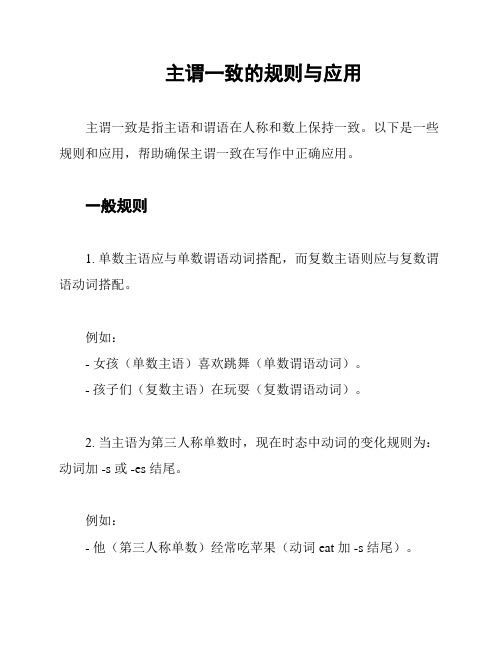
主谓一致的规则与应用主谓一致是指主语和谓语在人称和数上保持一致。
以下是一些规则和应用,帮助确保主谓一致在写作中正确应用。
一般规则1. 单数主语应与单数谓语动词搭配,而复数主语则应与复数谓语动词搭配。
例如:- 女孩(单数主语)喜欢跳舞(单数谓语动词)。
- 孩子们(复数主语)在玩耍(复数谓语动词)。
2. 当主语为第三人称单数时,现在时态中动词的变化规则为:动词加 -s 或 -es 结尾。
例如:- 他(第三人称单数)经常吃苹果(动词 eat 加 -s 结尾)。
3. 主谓一致也适用于过去时态。
例如:- 小狗(单数主语)跑了(过去时谓语动词)。
特殊情况1. 当主谓之间有连词和或者或时,谓语动词的单复数形式应根据连词前的主语来确定。
例如:- 马克或者凯特(复合主语)每天写作业(单数谓语动词)。
2. 当主语由两个或多个名词短语组成时,谓语动词的单复数形式应与离它最近的名词短语保持一致。
例如:- 咖啡和茶(复合主语)是她喜欢的饮品(复数谓语动词)。
3. 当主语由一个集合名词构成时,谓语动词的单复数形式取决于集合名词是否指一个整体还是其中的成员个体。
例如:- 代表团(集合名词)正在讨论(单数谓语动词)。
个别情况1. 当主语为复数名词,但表示一个整体时,谓语动词可与单数或复数搭配。
例如:- 四季(复数名词)是很美的(单数谓语动词)/ 四季(复数名词)都是很美的(复数谓语动词)。
2. 当主语为复数名词,但表示某种集合时,谓语动词通常与复数搭配。
例如:- 孩子们(复数名词)喜欢糖果(复数谓语动词)。
结论主谓一致是写作中一个重要的语法规则。
正确应用主谓一致有助于使句子更加清晰和易于理解。
根据不同的情况,采用上述规则和应用来确保主谓一致在语言表达中正确运用。
中的主谓一致规则及应用技巧
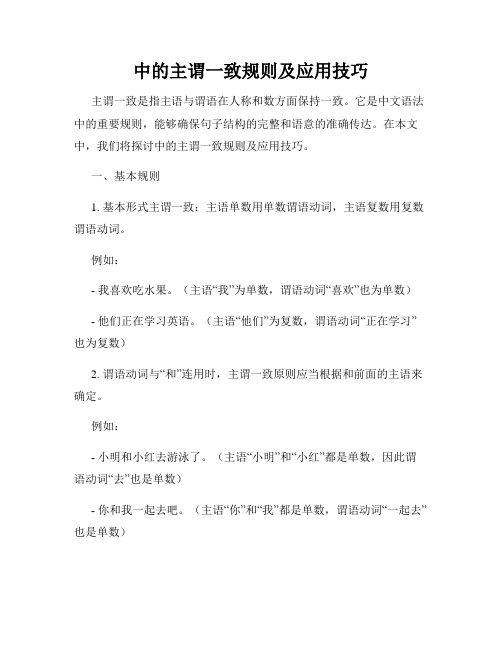
中的主谓一致规则及应用技巧主谓一致是指主语与谓语在人称和数方面保持一致。
它是中文语法中的重要规则,能够确保句子结构的完整和语意的准确传达。
在本文中,我们将探讨中的主谓一致规则及应用技巧。
一、基本规则1. 基本形式主谓一致:主语单数用单数谓语动词,主语复数用复数谓语动词。
例如:- 我喜欢吃水果。
(主语“我”为单数,谓语动词“喜欢”也为单数)- 他们正在学习英语。
(主语“他们”为复数,谓语动词“正在学习”也为复数)2. 谓语动词与“和”连用时,主谓一致原则应当根据和前面的主语来确定。
例如:- 小明和小红去游泳了。
(主语“小明”和“小红”都是单数,因此谓语动词“去”也是单数)- 你和我一起去吧。
(主语“你”和“我”都是单数,谓语动词“一起去”也是单数)3. 当主语由两个或多个单数名词或代词以“与”、“跟”、“和”等连接时,谓语动词的数与最近的名词或代词保持一致。
例如:- 你们和他来了。
(主语“你们”和“他”,“他”是单数,因此谓语动词“来了”也是单数)- 我和她买了很多衣服。
(主语“我”和“她”,“她”是单数,因此谓语动词“买了”也是单数)二、特殊情况及解决方法有些情况下,我们需要注意特殊的主谓一致规则,特别是当主语包含有数量词、集体名词和不定代词时。
1. 主语包含数量词时,谓语动词的单复数与数量词后面的名词保持一致。
例如:- 五个小朋友在玩耍。
(数量词“五个”后面的名词“小朋友”是复数,因此谓语动词“在玩耍”也是复数)- 一本书在桌上。
(数量词“一本”后面的名词“书”是单数,谓语动词“在”是单数)2. 主语是集体名词时,谓语动词的单复数根据语意来确定。
例如:- 一家人正在看电视。
(虽然“一家人”是集体名词,但看电视的动作是每个人在做,因此谓语动词“正在看”是复数)- 这个队伍的成员正在训练。
(虽然“队伍”是集体名词,但成员分别在训练,因此谓语动词“正在训练”是复数)3. 主语是不定代词时,谓语动词通过与不定代词的意义来确定。
主谓一致用法小结
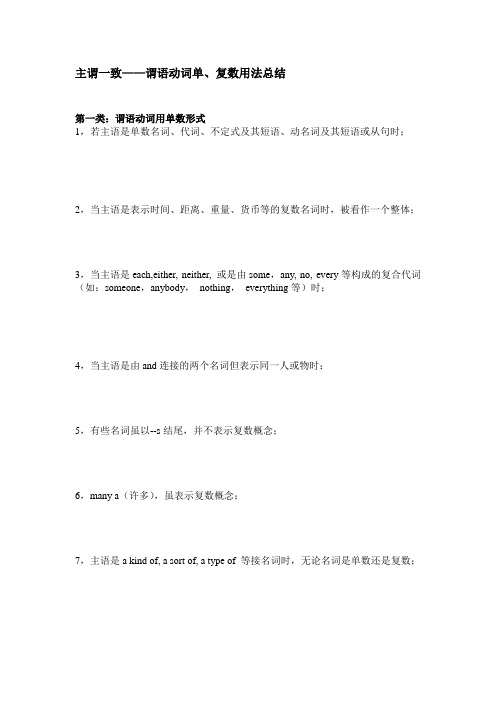
主谓一致——谓语动词单、复数用法总结第一类:谓语动词用单数形式1,若主语是单数名词、代词、不定式及其短语、动名词及其短语或从句时;2,当主语是表示时间、距离、重量、货币等的复数名词时,被看作一个整体;3,当主语是each,either, neither, 或是由some,any, no, every等构成的复合代词(如:someone,anybody,nothing,everything等)时;4,当主语是由and连接的两个名词但表示同一人或物时;5,有些名词虽以--s结尾,并不表示复数概念;6,many a(许多),虽表示复数概念;7,主语是a kind of, a sort of, a type of 等接名词时,无论名词是单数还是复数;第二类:谓语动词用复数形式1,主语是复数名词或代词时;2,主语是由and连接的两个及以上的人;3,主语是集体名词people,police,cattle 时;4,主语是one or two 加名词时;5,one of + 复数名词(此时先行词是复数名词);He is one of those astronauts who have walked on the moon.注意:the only one 的情况谓语用单数!!!She is the only one of those girls who has got scholarship.第三类:谓语动词单复数形式都可以第四类:谓语动词单复数形式具体而定1,what 或whatever引导的主语从句中;2,none ;3.有些集体名词,如family,team,company, crowd, enemy, group, couple, public, population, majority, government, committee, mankind 等;4,当what,who,which,any,more,all,most,such等代词作主语时;5,。
初中英语知识点归纳主谓一致的分类和用法
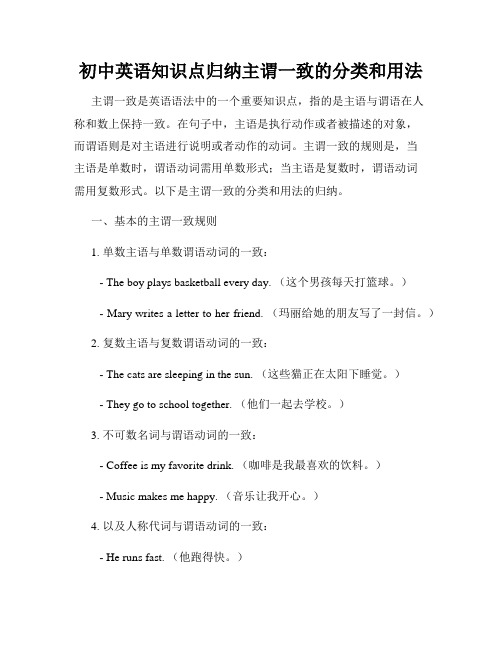
初中英语知识点归纳主谓一致的分类和用法主谓一致是英语语法中的一个重要知识点,指的是主语与谓语在人称和数上保持一致。
在句子中,主语是执行动作或者被描述的对象,而谓语则是对主语进行说明或者动作的动词。
主谓一致的规则是,当主语是单数时,谓语动词需用单数形式;当主语是复数时,谓语动词需用复数形式。
以下是主谓一致的分类和用法的归纳。
一、基本的主谓一致规则1. 单数主语与单数谓语动词的一致:- The boy plays basketball every day. (这个男孩每天打篮球。
)- Mary writes a letter to her friend. (玛丽给她的朋友写了一封信。
)2. 复数主语与复数谓语动词的一致:- The cats are sleeping in the sun. (这些猫正在太阳下睡觉。
)- They go to school together. (他们一起去学校。
)3. 不可数名词与谓语动词的一致:- Coffee is my favorite drink. (咖啡是我最喜欢的饮料。
)- Music makes me happy. (音乐让我开心。
)4. 以及人称代词与谓语动词的一致:- He runs fast. (他跑得快。
)- We are studying English. (我们正在学习英语。
)二、特殊情况的主谓一致规则1. 当主语是由“each”、“every”、“everyone”、“everybody”、“either”、“neither”等引导的词时,用单数谓语动词:- Every student needs to study hard. (每个学生都需要努力学习。
) - Neither of the boys is interested in football. (这两个男孩都对足球不感兴趣。
)2. 当主语是由“some”或“any”等修饰的复数名词时,根据后面的名词的属性决定谓语动词的单复数:- Some of the apples are ripe. (一些苹果已经熟了。
主谓一致详细讲解

主谓一致主谓一致指的是句子的主语和谓语在人称和数上要保持一致,通常有以下三种原则:语法一致原则主语和谓语通常是在语法形式上取得一致,即主语是单数形式,谓语动词用单数形式;主语是复数形式,谓语动词用复数形式。
1. 单数主语搭配单数谓语:如果主语是可数名词单数、不可数名词或者第三人称单数代词(如he、she、it 等),谓语动词要用相应的单数形式。
The dog runs fast. 主语“dog” 是可数名词单数,谓语动词“runs” 采用了第三人称单数形式。
Water is essential for life. water为不可数名词,谓语动词“is” 是单数形式。
2. 复数主语搭配复数谓语:当主语是可数名词复数时,谓语动词需使用复数形式。
The trees are green in spring. trees为可数名词复数,谓语动词“are” 是复数形式。
3.当and 或both...and..连接两个或两个以上名词作主语时,谓语动词用复数形式。
Tom and Mike are good friends.汤姆和迈克是好朋友。
Both Lucy and Lily are students.露西和莉莉都是学生。
4. 不定代词either, neither, each one, the other, another, anybody , anyone , anything , someone , somebody , something, everyone,everybody ,everything , nobody , no one , nothing等作主语时,谓语动词用单数形式。
Everyone is ready for the sports meeting.大家都在为运动会做准备。
5. 由each , each...and each..., every ...and every...作主语时,谓语动词用单数形式。
主谓一致的规则及例句分析
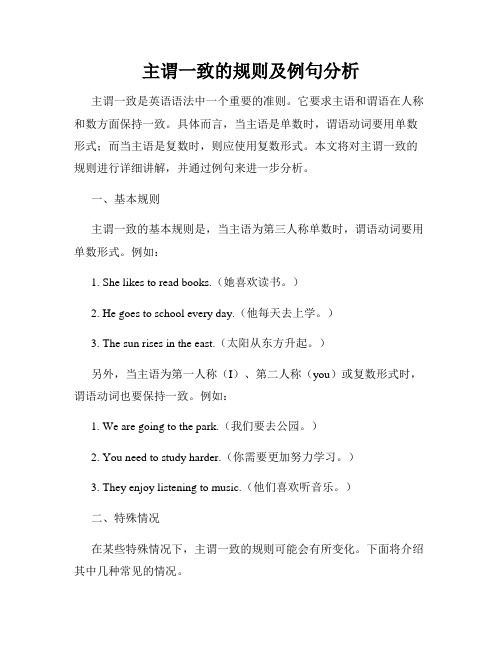
主谓一致的规则及例句分析主谓一致是英语语法中一个重要的准则。
它要求主语和谓语在人称和数方面保持一致。
具体而言,当主语是单数时,谓语动词要用单数形式;而当主语是复数时,则应使用复数形式。
本文将对主谓一致的规则进行详细讲解,并通过例句来进一步分析。
一、基本规则主谓一致的基本规则是,当主语为第三人称单数时,谓语动词要用单数形式。
例如:1. She likes to read books.(她喜欢读书。
)2. He goes to school every day.(他每天去上学。
)3. The sun rises in the east.(太阳从东方升起。
)另外,当主语为第一人称(I)、第二人称(you)或复数形式时,谓语动词也要保持一致。
例如:1. We are going to the park.(我们要去公园。
)2. You need to study harder.(你需要更加努力学习。
)3. They enjoy listening to music.(他们喜欢听音乐。
)二、特殊情况在某些特殊情况下,主谓一致的规则可能会有所变化。
下面将介绍其中几种常见的情况。
1. 带有复数意义的名词:有些名词本身是复数形式,但表示一个整体概念时,谓语动词仍用单数形式。
例如:The United States is a developed country.(美国是一个发达国家。
)My glasses need cleaning.(我的眼镜需要清洗。
)2. 连接词and:当连词and连接两个主语时,如果主语是同一个人或物,则谓语动词用单数形式;如果主语是不同的人或物,则谓语动词用复数形式。
例如:Tom and Jerry is a famous cartoon.(汤姆和杰里是一部著名的卡通片。
)My father and I are going to the movies.(我爸爸和我要去看电影。
)3. 具有共同身份的单数名词:一些单数名词,尽管在形式上是单数,但表示一类事物时,谓语动词仍用复数形式。
英语主谓一致十大总结

英语主谓一致十大总结主谓一致是英语语法中的重要部分,指的是主语与谓语之间在人称和数上的一致。
正确使用主谓一致规则能够使句子更加准确、流畅。
下面是英语主谓一致的十大总结。
1. 单数主语,单数谓语当句子的主语是单数形式时,谓语动词也要使用单数形式。
例如:- The cat dives gracefully into the water.2. 复数主语,复数谓语当句子的主语是复数形式时,谓语动词也要使用复数形式。
例如:- The cats dive gracefully into the water.3. 主语是不可数名词,谓语使用单数不可数名词是指无法分为可数单位的名词,如water、knowledge等。
当句子的主语是不可数名词时,谓语动词使用单数形式。
例如:- The water flows smoothly down the river.4. 主语包括and连接的两个或多个名词,谓语使用复数当句子的主语由and连接的两个或多个名词组成时,谓语动词使用复数形式。
例如:- Tom and Jerry are good friends.5. 主语包括either/or、neither/nor连接的两个名词,谓语与最近的名词保持一致当句子的主语由either/or、neither/nor等连接的两个名词组成时,谓语动词与最近的名词在人称和数上保持一致。
例如:- Either Tom or Jerry is responsible for the mess.6. 主语是集体名词,谓语根据上下文确定单复数集体名词指代一群人或事物的总称,如team、family等。
谓语动词的单复数形式根据上下文来确定。
例如:- The family goes to the park every weekend.7. 主语是某些固定短语时,谓语使用单数某些固定短语作为主语时,谓语动词使用单数形式。
例如:- Bread and butter is a common breakfast choice.8. 主语是以each、every、everyone、everything等开头时,谓语使用单数当句子的主语以each、every、everyone、everything等词开头时,谓语动词使用单数形式。
高考英语主谓一致知识点总结
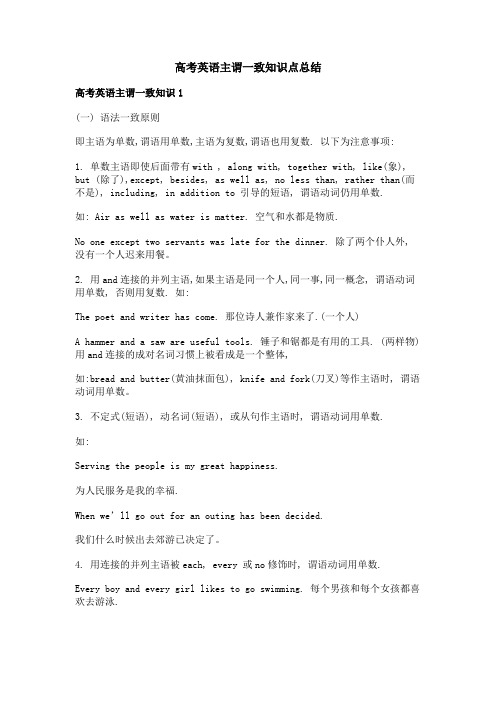
高考英语主谓一致知识点总结高考英语主谓一致知识1(一) 语法一致原则即主语为单数,谓语用单数,主语为复数,谓语也用复数. 以下为注意事项:1. 单数主语即使后面带有with , along with, together with, like(象), but (除了),except, besides, as well as, no less than, rather than(而不是), including, in addition to 引导的短语, 谓语动词仍用单数.如: Air as well as water is matter. 空气和水都是物质.No one except two servants was late for the dinner. 除了两个仆人外, 没有一个人迟来用餐。
2. 用and连接的并列主语,如果主语是同一个人,同一事,同一概念, 谓语动词用单数, 否则用复数. 如:The poet and writer has come. 那位诗人兼作家来了.(一个人)A hammer and a saw are useful tools. 锤子和锯都是有用的工具. (两样物)用and连接的成对名词习惯上被看成是一个整体,如:bread and butter(黄油抹面包), knife and fork(刀叉)等作主语时, 谓语动词用单数。
3. 不定式(短语), 动名词(短语), 或从句作主语时, 谓语动词用单数.如:Serving the people is my great happiness.为人民服务是我的幸福.When we’ll go out for an outing has been decided.我们什么时候出去郊游已决定了。
4. 用连接的并列主语被each, every 或no修饰时, 谓语动词用单数.Every boy and every girl likes to go swimming. 每个男孩和每个女孩都喜欢去游泳.No teacher and no student was absent from the meeting. 没有老师也没有学生开会缺席.Each man and (each) woman is asked to help. 每个男人和每个女人都被请去帮忙。
主谓一致的用法详解

主谓一致的用法详解主谓一致是英语语法中的一个重要概念,它要求主语和谓语在人称和数上保持一致。
正确运用主谓一致规则不仅可以使句子表达准确,还可以提升整体语言的流畅性和规范性。
本文将详细介绍主谓一致的用法及相关注意事项。
一、基本规则1. 单数主语对应单数谓语动词:例子:The cat sleeps on the sofa.(猫在沙发上睡觉。
)2. 复数主语对应复数谓语动词:例子:The dogs bark loudly.(狗在大声叫。
)3. 不可数名词作主语时,谓语动词通常用单数形式:例子:Time flies.(时间飞逝。
)二、特殊情况及注意事项1. 复合主语当主语由两个或更多名词组成,并由and连接时,谓语动词通常用复数形式:例子:Tom and Jerry are good friends.(汤姆和杰瑞是好朋友。
)2. 不定代词的用法a) 当不定代词everyone,everyone,either,neither或many a以及由some,any,no等词构成的不定代词做主语时,谓语动词用单数形式:例子:Everyone has their own dreams.(每个人都有自己的梦想。
)b) 当不定代词some,many或both作主语时,谓语动词的单复数形式根据其后的名词决定:例子:Some of the students are going on a field trip.(一些学生将进行实地考察。
)3. 存在复数主语的情况a) 当两个或多个单数主语被连接词and连接时,谓语动词用复数形式:例子:Bread and butter are my breakfast.(面包和黄油是我的早餐。
)b) 当两个或多个单数主语由or或nor连接时,谓语动词与最近的主语保持一致:例子:Neither the cat nor the dog likes milk.(猫和狗都不喜欢牛奶。
)4. 存在特殊句型的情况a) 当主语是以“The only one of...”或“One of...”开头的句子时,谓语动词的单复数形式取决于其后的名词:例子:One of my friends is coming to visit me.(我的一个朋友要来看我。
初中英语主谓一致知识点归纳
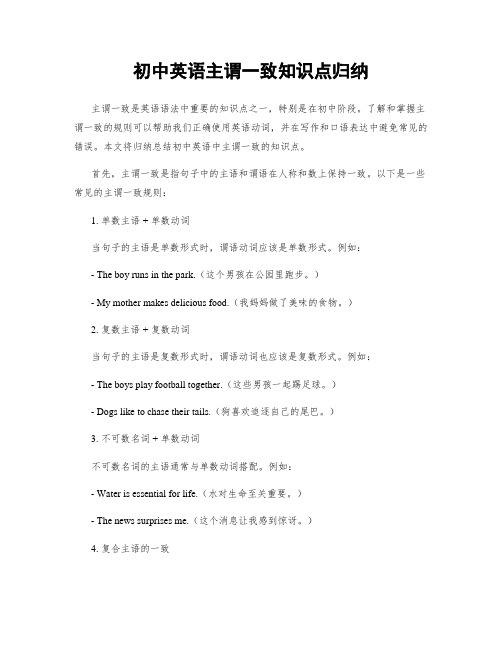
初中英语主谓一致知识点归纳主谓一致是英语语法中重要的知识点之一,特别是在初中阶段。
了解和掌握主谓一致的规则可以帮助我们正确使用英语动词,并在写作和口语表达中避免常见的错误。
本文将归纳总结初中英语中主谓一致的知识点。
首先,主谓一致是指句子中的主语和谓语在人称和数上保持一致。
以下是一些常见的主谓一致规则:1. 单数主语 + 单数动词当句子的主语是单数形式时,谓语动词应该是单数形式。
例如:- The boy runs in the park.(这个男孩在公园里跑步。
)- My mother makes delicious food.(我妈妈做了美味的食物。
)2. 复数主语 + 复数动词当句子的主语是复数形式时,谓语动词也应该是复数形式。
例如:- The boys play football together.(这些男孩一起踢足球。
)- Dogs like to chase their tails.(狗喜欢追逐自己的尾巴。
)3. 不可数名词 + 单数动词不可数名词的主语通常与单数动词搭配。
例如:- Water is essential for life.(水对生命至关重要。
)- The news surprises me.(这个消息让我感到惊讶。
)4. 复合主语的一致当句子的主语是由两个或更多个名词组成时,谓语动词的形式取决于最靠近动词的名词。
例如:- Peanut butter and jelly is my favorite sandwich.(花生酱和果酱是我最喜欢的三明治。
)- My sister and her friends are going to the party.(我姐姐和她的朋友们要去参加聚会。
)除了以上的基本规则外,还有一些常见的特殊情况需要注意:1. 以及(and)、连同(along with)、和(as well as)等连词连接的复合主语,谓语动词要与前面的主语一致。
例如:- The dog, as well as the cats, loves to play outside.(这只狗和这些猫都喜欢在外面玩。
高中英语知识点归纳主谓一致的规则总结
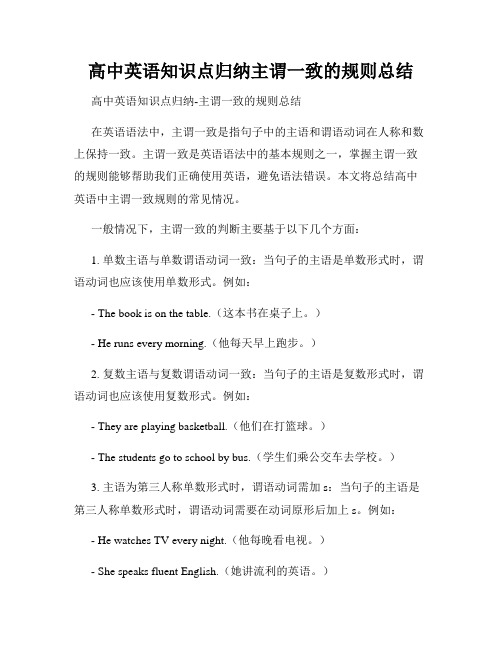
高中英语知识点归纳主谓一致的规则总结高中英语知识点归纳-主谓一致的规则总结在英语语法中,主谓一致是指句子中的主语和谓语动词在人称和数上保持一致。
主谓一致是英语语法中的基本规则之一,掌握主谓一致的规则能够帮助我们正确使用英语,避免语法错误。
本文将总结高中英语中主谓一致规则的常见情况。
一般情况下,主谓一致的判断主要基于以下几个方面:1. 单数主语与单数谓语动词一致:当句子的主语是单数形式时,谓语动词也应该使用单数形式。
例如:- The book is on the table.(这本书在桌子上。
)- He runs every morning.(他每天早上跑步。
)2. 复数主语与复数谓语动词一致:当句子的主语是复数形式时,谓语动词也应该使用复数形式。
例如:- They are playing basketball.(他们在打篮球。
)- The students go to school by bus.(学生们乘公交车去学校。
)3. 主语为第三人称单数形式时,谓语动词需加s:当句子的主语是第三人称单数形式时,谓语动词需要在动词原形后加上s。
例如:- He watches TV every night.(他每晚看电视。
)- She speaks fluent English.(她讲流利的英语。
)4. 若主语为不可数名词,则谓语动词使用单数形式:当句子的主语是不可数名词时,谓语动词通常使用单数形式。
例如:- Water is essential for life.(水对生命至关重要。
)- Happiness brings people joy.(幸福给人们带来快乐。
)5. 当主语由连词and连接时,需判断主语是否并列:当句子的主语由连词and连接时,需根据主语是否构成并列关系来确定谓语动词的形式。
如果主语为单数形式,则使用单数谓语动词;如果主语为复数形式,则使用复数谓语动词。
例如:- Tom and John are brothers.(汤姆和约翰是兄弟。
主谓一致的规则及应用

主谓一致的规则及应用主谓一致是英语语法中的基本规则,指的是主语与谓语在人称和数上保持一致。
正确运用主谓一致规则会增强句子的准确性和流畅性,使表达更加清晰。
本文将介绍主谓一致的规则,并给出一些应用实例。
一、基本规则1. 单数主语与单数谓语动词一致。
例如:- The cat is sleeping.(这只猫在睡觉。
)- She runs every morning.(她每天早上跑步。
)2. 复数主语与复数谓语动词一致。
例如:- The students are studying in the library.(学生们正在图书馆学习。
)- They play football every weekend.(他们每个周末踢足球。
)3. 不可数名词作主语时,谓语动词通常使用单数形式。
例如:- Rice is a staple food in many countries.(米饭是许多国家的主食。
)- Water is essential for life.(水对生命至关重要。
)4. 用作主语的不定代词通常与单数谓语动词一致。
例如:- Everyone wants to be happy.(每个人都想要快乐。
)- Somebody has left their bag here.(有人把包落在这里了。
)5. 连接词and连接的两个主语,谓语动词通常与复数一致。
例如:- Tom and Jerry are good friends.(汤姆和杰瑞是好朋友。
)- My mom and dad like gardening.(我爸爸妈妈喜欢园艺。
)二、特殊情况1. 数量词、百分数加名词短语作主语时,谓语动词取决于名词短语中的名词单复数形式。
例如:- Fifty percent of the students are girls.(百分之五十的学生是女孩。
)- A lot of money has been spent on this project.(这个项目花费了很多钱。
主谓一致的正确运用方法

主谓一致的正确运用方法主谓一致是指主语和谓语在人称和数方面保持一致。
主谓一致错误是常见的语法错误之一,容易造成句子不通顺,语法不正确的问题。
在英语写作中,准确运用主谓一致是非常重要的。
本文将探讨主谓一致的正确运用方法,帮助读者避免常见的错误。
一、单数主语和单数谓语的一致当主语是单数时,谓语动词也应使用单数形式。
例如:- She plays the piano every day.- The cat likes to sleep on the sofa.二、复数主语和复数谓语的一致当主语是复数时,谓语动词也应使用复数形式。
例如:- They enjoy playing basketball together.- The dogs bark loudly at night.三、不可数名词和单数谓语的一致不可数名词作主语时,谓语动词也应使用单数形式。
例如:- Rice is a staple food in many Asian countries.- Music brings joy to people's lives.四、连接词引导的主语和谓语的一致当主语由连接词引导时,谓语动词的形式应与连接词后的名词一致。
例如:- The book and the pen are on the table.- Neither the teacher nor the students were happy with the test results.五、复合主语的一致当主语由两个或更多个名词组成时,谓语动词形式应与最靠近它的名词保持一致。
例如:- Bread and butter is a common breakfast choice.- My best friend and roommate is studying abroad this semester.六、主语是单数,但用复数谓语当主语为单数,但表示一组或集体的时候,可以使用复数形式的谓语动词。
高中英语知识点归纳主谓一致的用法及常见情况
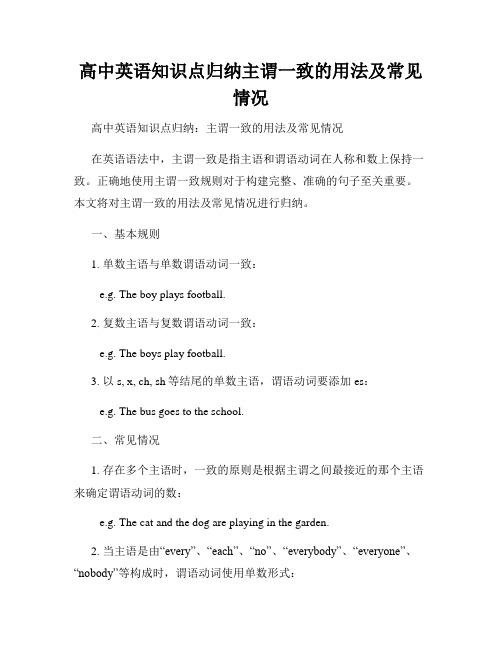
高中英语知识点归纳主谓一致的用法及常见情况高中英语知识点归纳:主谓一致的用法及常见情况在英语语法中,主谓一致是指主语和谓语动词在人称和数上保持一致。
正确地使用主谓一致规则对于构建完整、准确的句子至关重要。
本文将对主谓一致的用法及常见情况进行归纳。
一、基本规则1. 单数主语与单数谓语动词一致:e.g. The boy plays football.2. 复数主语与复数谓语动词一致:e.g. The boys play football.3. 以s, x, ch, sh等结尾的单数主语,谓语动词要添加es:e.g. The bus goes to the school.二、常见情况1. 存在多个主语时,一致的原则是根据主谓之间最接近的那个主语来确定谓语动词的数:e.g. The cat and the dog are playing in the garden.2. 当主语是由“every”、“each”、“no”、“everybody”、“everyone”、“nobody”等构成时,谓语动词使用单数形式:e.g. Every student needs to bring their own stationery.3. 当主语是由“both”、“few”、“many”、“several”等构成时,谓语动词使用复数形式:e.g. Both of my friends are going on vacation.4. 当主语是不可数名词时,谓语动词使用单数形式:e.g. The news is very interesting.5. 当主语是由“either...or...”、“neither...nor...”、“not only...but also...”等连接形式构成时,谓语动词的数取决于后面最近的主语:e.g. Either the students or the teacher is responsible for the accident.三、例外情况1. 部分名词具有特殊的复数形式,但在构成主谓一致时仍需要采用单数谓语动词:e.g. Mathematics is my favorite subject.2. 以下代词以及“There be”结构用单数谓语动词:- anybody- anyone- anything- everybody- everyone- everything- nobody- no one- nothing- somebody- someone- something参考以上规则和例外情况,我们能够正确地运用主谓一致的规则来构建准确、通顺的句子。
初中知识点归纳主谓一致的基本规则

初中知识点归纳主谓一致的基本规则主谓一致是英语语法中的基本规则之一,它指的是主语和谓语在人称和数上要保持一致。
准确掌握主谓一致的规则对于正确理解和运用英语语法至关重要。
本文将对初中阶段的主谓一致的基本规则进行归纳总结,并给出一些例句以帮助读者更好地掌握和运用这一知识点。
1. 单数主语与单数谓语当主语是单数形式时,谓语动词要使用单数形式。
例:The cat eats fish.(这只猫吃鱼。
)2. 复数主语与复数谓语当主语是复数形式时,谓语动词要使用复数形式。
例:Cats eat fish.(猫吃鱼。
)3. 不可数名词作主语不可数名词作主语时,谓语动词一般使用单数形式。
例:Rice is my favorite food.(米饭是我最喜欢的食物。
)4. 谓语动词与主语中间有词组如果主语与谓语之间存在词组,与谓语动词无关,不会对谓语动词的形式产生影响。
例:The cat, together with its kittens, is sleeping.(这只猫和它的小猫们正在睡觉。
)5. 主语由连接词and连接当主语由连接词"and"连接时,如果主语是两个不同的人或物,谓语使用复数形式。
但如果主语表示同一事物或同一概念,则谓语使用单数形式。
例:My brother and sister are playing in the garden.(我的哥哥和妹妹正在花园里玩。
)The horse and carriage is ready.(马和马车已经准备好了。
)6. 主语为复数词汇,但表示一个整体有些名词虽然是复数形式,但在特定情况下表示一个整体,这时谓语动词使用单数形式。
例:The United States is a big country.(美国是一个大国。
)Mathematics is my favorite subject.(数学是我最喜欢的科目。
)7. 当主谓多个成分时的一致当主语中有and, or, neither...nor, either...or等连接词连接多个成分时,谓语动词与最靠近它的成分保持一致。
英语语法主谓一致时单数复数解析
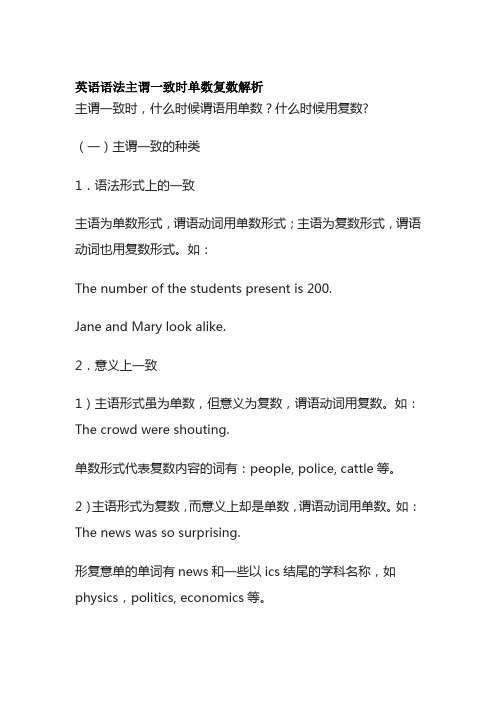
英语语法主谓一致时单数复数解析主谓一致时,什么时候谓语用单数?什么时候用复数?(一)主谓一致的种类1.语法形式上的一致主语为单数形式,谓语动词用单数形式;主语为复数形式,谓语动词也用复数形式。
如:The number of the students present is 200.Jane and Mary look alike.2.意义上一致1)主语形式虽为单数,但意义为复数,谓语动词用复数。
如:The crowd were shouting.单数形式代表复数内容的词有:people, police, cattle等。
2)主语形式为复数,而意义上却是单数,谓语动词用单数。
如:The news was so surprising.形复意单的单词有news和一些以ics结尾的学科名称,如physics,politics, economics等。
3.就近原则即谓语动词的单、复数形式取决于最靠近它的词语。
如用连词or,either…or, neither…not, not only…but also等连接的并列主语,如果一个是单数,一个是复数,谓语动词与靠近它的主语一致。
如:Either your students or Mr. Wang knows them.(二)主谓一致的应用1.名词作主语1)某些集体名词,如family, team等作主语时,如果作为一个整体看待,谓语动词用单数形式,如果就其中一个个成员而言,谓语动词用复数形式。
如:His family is a happy one.The whole family are watching TV.这类名词有:audience,class,club,company,crew,enemy,crowd,government,group,party,public,team等。
名词population一词的使用情况类似。
“a group(crowd) of +复数名词”等短语之后的谓语动词也同样可用单数或复数,前者强调整体,后者强调各个部分。
“单数还是复数”——主谓一致用法归纳
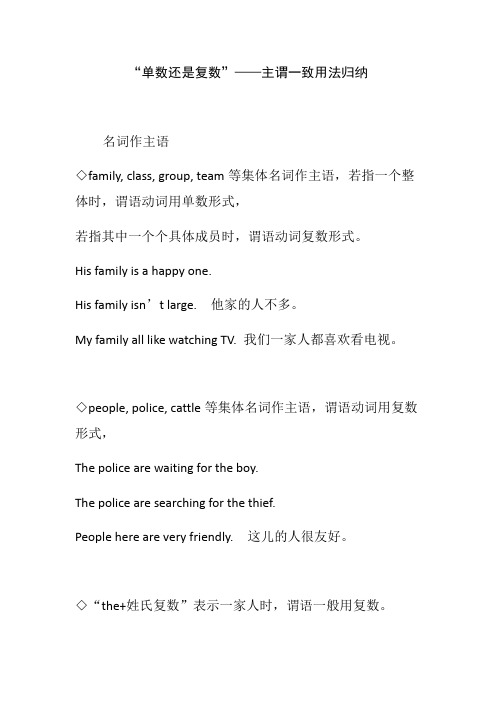
“单数还是复数”——主谓一致用法归纳名词作主语◇family, class, group, team等集体名词作主语,若指一个整体时,谓语动词用单数形式,若指其中一个个具体成员时,谓语动词复数形式。
His family is a happy one.His family isn’t large. 他家的人不多。
My family all like watching TV. 我们一家人都喜欢看电视。
◇people, police, cattle等集体名词作主语,谓语动词用复数形式,The police are waiting for the boy.The police are searching for the thief.People here are very friendly. 这儿的人很友好。
◇“the+姓氏复数”表示一家人时,谓语一般用复数。
The Smiths are having dinner.◇“the+形容词”表示一类人时,谓语动词用复数形式,这类词有:the brave, the poor, the rich,the blind, the young, the old, the sick, the dead, the deaf and dumb, the injured,the wounded,the unemployed等。
表示抽象概念时,用单数形式。
例如:The poor are very happy, but the rich are sad. 穷人很快乐,富人却过得不快乐。
The beautiful lives forever. 美是永存的。
◇以-s 结尾的名词本身不表示复数意义,谓语通常用单数形式,如news, maths, physics等,例如:No news is good news. 没有消息就是好消息。
Maths is very popular in our class 在我们班数学很受欢迎。
单数还是复数——主谓一致用法归纳

“单数仍是复数?”——主谓一致用法概括名词作主语◇family, class, group, team 等集体名词作主语,若指一个整体时,谓语动词用单数形式,若指此中一个个详细成员时,谓语动词复数形式。
His family is a happy one.His family isn’ t large他.家的人不多。
My family all like watching TV.我们一家人都喜爱看电视。
◇people, police, cattle 等集体名词作主语,谓语动词用复数形式,The police are waiting for the boy.The police are searching for the thief.People here are very friendly.这儿的人很友善。
◇“ the+ 姓氏复数”表示一家人时,谓语一般用复数。
The Smiths are having dinner.◇“ the+ 形容词”表示一类人时,谓语动词用复数形式,这种词有: the brave, the poor, the rich,the blind, the young, the old, the sick, the dead, the deafand dumb, the injured,the wounded,the unemployed等。
表示抽象观点时,用单数形式。
比如:The poor are very happy, but the rich are sad.穷人很快乐,富人却过得不快乐。
The beautiful lives forever.美是永存的。
◇以-s 结尾的名词自己不表示复数意义,谓语往常用单数形式,如 news, maths, physics 等,比如:No news is good news.没有信息就是好信息。
Maths is very popular in our class在我们班数学很受欢迎。
句子的主谓一致性
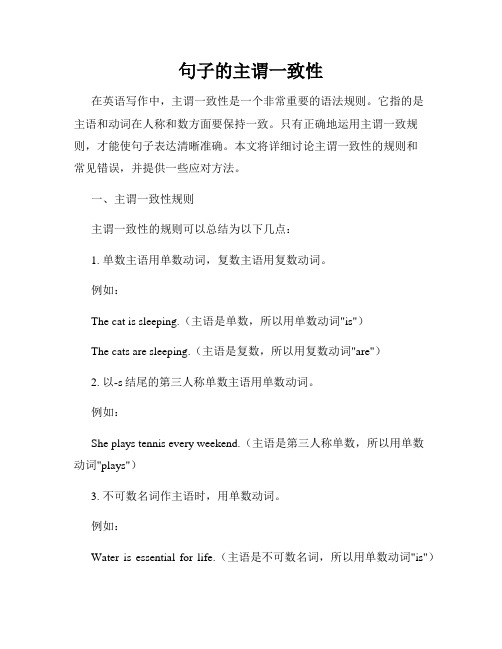
句子的主谓一致性在英语写作中,主谓一致性是一个非常重要的语法规则。
它指的是主语和动词在人称和数方面要保持一致。
只有正确地运用主谓一致规则,才能使句子表达清晰准确。
本文将详细讨论主谓一致性的规则和常见错误,并提供一些应对方法。
一、主谓一致性规则主谓一致性的规则可以总结为以下几点:1. 单数主语用单数动词,复数主语用复数动词。
例如:The cat is sleeping.(主语是单数,所以用单数动词"is")The cats are sleeping.(主语是复数,所以用复数动词"are")2. 以-s结尾的第三人称单数主语用单数动词。
例如:She plays tennis every weekend.(主语是第三人称单数,所以用单数动词"plays")3. 不可数名词作主语时,用单数动词。
例如:Water is essential for life.(主语是不可数名词,所以用单数动词"is")4. 合成主语使用复数动词。
例如:Bread and butter are my favorite breakfast.(合成主语"Bread and butter"是复数,所以用复数动词"are")二、常见错误和案例分析1. 省略助动词"do"时的一致性错误。
错误示例:She not like coffee.修正示例:She does not like coffee.解析:在否定句和疑问句中,需要使用助动词"do"来辅助动词的一致性。
正确的用法应该是:She does not like coffee.2. 主语和谓语之间插入短语导致一致性错误。
错误示例:The girl with glasses have arrived.修正示例:The girl with glasses has arrived.解析:当主语和谓语之间插入短语时,不要受短语的影响,要根据主语的单复数来确定动词的单复数形式。
- 1、下载文档前请自行甄别文档内容的完整性,平台不提供额外的编辑、内容补充、找答案等附加服务。
- 2、"仅部分预览"的文档,不可在线预览部分如存在完整性等问题,可反馈申请退款(可完整预览的文档不适用该条件!)。
- 3、如文档侵犯您的权益,请联系客服反馈,我们会尽快为您处理(人工客服工作时间:9:00-18:30)。
“单数还是复数?”——主谓一致用法归纳名词作主语◇family, class, group, team等集体名词作主语,若指一个整体时,谓语动词用单数形式,若指其中一个个具体成员时,谓语动词复数形式。
His family is a happy one.His family isn’t large. 他家的人不多。
My family all like watching TV. 我们一家人都喜欢看电视。
◇people, police, cattle等集体名词作主语,谓语动词用复数形式,The police are waiting for the boy.The police are searching for the thief.People here are very friendly. 这儿的人很友好。
◇“the+姓氏复数”表示一家人时,谓语一般用复数。
The Smiths are having dinner.◇“the+形容词”表示一类人时,谓语动词用复数形式,这类词有:the brave, the poor, the rich,the blind, the young, the old, the sick, the dead, the deafand dumb, the injured,the wounded,the unemployed等。
表示抽象概念时,用单数形式。
例如:The poor are very happy, but the rich are sad. 穷人很快乐,富人却过得不快乐。
The beautiful lives forever. 美是永存的。
◇以-s 结尾的名词本身不表示复数意义,谓语通常用单数形式,如news, maths, physics等,例如:No news is good news. 没有消息就是好消息。
Maths is very popular in our class 在我们班数学很受欢迎。
◇more than one+单数名词作主语,谓语用单数。
例如:More than one student has ever been to Beijing. 不止一个学生曾经去过北京。
◇表示时间,价格,重量,数目,长度,数学运算等的词或短语作主语时,这些通常作一个整体概念,谓语用单数形式。
例如:Three years has passed since then.Two months is a long holiday. 两个月是一个长假。
Twenty pounds isn’t so heavy. 20英镑并不太重。
Ten miles isn’t a long distance. 1 0英里并不是一段很长的距离。
Five minus four is one. 5减4等于1。
◇a number of+复数名词作主语,谓语动词用复数;the number of +复数名词作主语,谓语动词用单数。
例如:A number of famous people were invited to party. 许多名人都被邀请参加这个聚会。
The number of the students is over eight hundred. 我们学校的学生数超过800人。
A number of students have gone home.The number of pages in this book is two hundred.◇动词不定式,动名词作主语时,谓语动词用单数形式。
例如:To see is to believe 眼见为实。
Doing eye exercises is good for your eyes. 做眼睛保健操对你的眼睛十分有益。
◇主语为one of , each of, every one of, any one of加复数名词或代词,谓语用单数。
如:One of my favorite sports is basketball.Each of them has an English dictionary. 他们每人都有一本英语词典。
◇当kind of, pair of, glass of 等表示确定数量的名词短语修饰主语时,谓语与kind, pair, glass等一致。
例如:This pair of shoes is Tom’s. 这双鞋是汤姆的。
There are two glasses of water on the table. 桌上有两杯水。
A pair of shoes was on the desk.◇“lots of/ a lot of/plenty of/ all/ most/ half / the rest of +名词”或“分数/百分数+名词”作主语时,谓语动词取决于名词的数;若是不可数名词,用单数;若名词是复数,则用复数。
这是因为短语中后面的名词是中心词,而短语中前面的量词是修饰语。
Lots of damage was caused by fire.About three-fourths of the earth’s surface i s covered with water.Three-fifths of the workers here are women.Most of his time is spent on study.代词作主语◇none 与可数名词连用,谓语动词可用单数也可用复数,none 如果代表不可数名词时谓语动词用单数。
None of the land has become desert.这些土地都没有变成沙漠。
◇不定代词somebody, someone, something, anybody, anything, everybody, everyone, everything,nobody, no one, nothing作主语,谓语动词用单数,例如:Is everyone here today? 今天大家到齐了吗?Something is wrong with him. 他有毛病。
Nobody was in. 没有人在家。
◇疑问代词who, what, which作主语时,如果说话人不知道具体的内容,谓语动词一般用单数。
Who lives next door?What’s in the bag?并列结构作主语◇由both…and…连接两个单数名词作主语时,谓语动词用复数形式;Both his father and his mother are both teachers. 他的爸爸和妈妈都是老师。
◇由and连接的两个名词作主语时,一般用复数形式。
Walking and riding are good exercises.但and所连接的并列主语是同一个人,谓语动词用单数,这时and后面的名词没有冠词。
如:The writer and teacher is coming. 那位作家兼教师来了。
(作家和教师指同一个人)The writer and the teacher are coming. 作家和老师来了。
(作家和老师是两个人)and前后的并列主语如果表示的是同一个概念,即前后合起来是一个整体,不可割裂开来,谓语动词依然用单数形式。
Going to bed early and getting up early is a good habit.A knife and fork is on the table.(刀叉和在一起才是完整的一副。
)Too much work and too little rest often leads to illness. (9A 125) 工作太多休息太少常常导致疾病。
◇or, either…or…,neither…nor…,not only…butalso…,not…but…,连接两个名词或代词作主语时,根据就近原则决定谓语动词形式。
例如:Tom or Jack is wrong. 不是汤姆就是杰克错了。
Either you or I am right. 要么你要么我是对的。
◇当主语后面跟有with,together with,along with,as well as,besides,except,but,like,including, in addition to, rather than等词或介词短语时,谓语动词由主语的单复数决定。
例如:Mike with his father has been to England. 迈克同他的父亲去过英格兰。
Mike, like his brother, enjoys playing football 迈克像他的哥哥一样喜欢踢足球。
The teacher as well as the students was reading in the library.与句式有关的主谓一致◇由what引导的主语从句,谓语动词通常用单数,但所指的具体内容是复数意义时,谓语动词一般用复数形式,例如:What we need is more time.What we need are doctors.◇在地点置于句首的倒装句中,谓语动词的数应与其后的主语一致。
如:Here comes Simon.Here are some books and paper for you. 这是给你的书和纸。
Between the two windows hangs a picture.◇There be 结构中,谓语动词与临近的主语一致,即“就近原则”。
例如:There is a book and three pens on the desk. 桌子上有一本书,三只钢笔。
◇关系代词who, that, which等在定语从句中作主语时,其谓语动词的数应与句中先行词的数一致。
Those who want to go please put up your hands.Some of the energy that is used by man comes from the sun.以下为高中阶段主谓一致内容,仅供参考。
◇如果主语有more than one…或many a…构成,尽管从意义上看是复数内容,但它的谓语动词仍用单数形式。
如:More than one student has read the book.Many a girl has been there.Many a student has been to Shanghai. 许多学生到过上海。
◇主语是each/every/no+单数名词+and(each/every)+单数名词时,谓语动词用单数。
